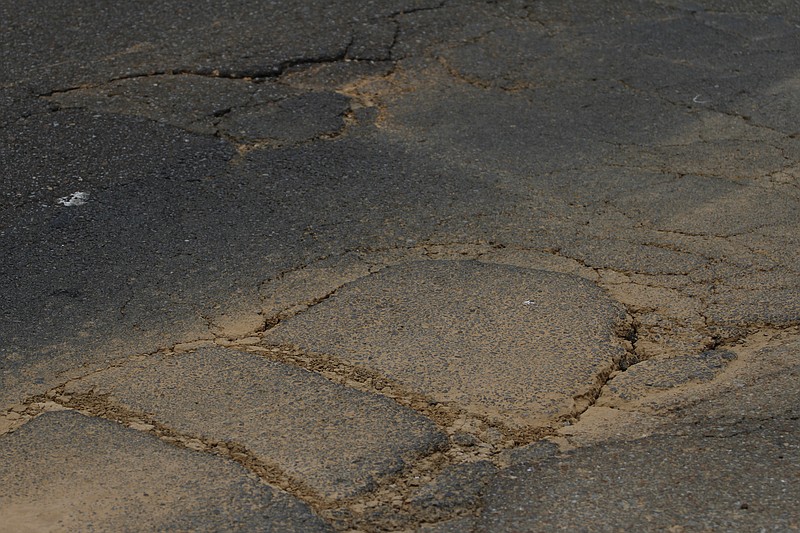One look at Chattanooga's 2019 Community Survey might provide the impetus for a winning campaign for a candidate in the city's mayoral race slightly more than 16 months from now.
Given the results in the survey, the candidate who declares he or she will make improvement of roads their most important task might be the winner in a landslide.
Tellingly, in rating city streets for smoothness, the percentage of survey respondents who chose "very good" or "good" dropped 17% from 2012 to 2019. More ominously, the 7% drop in the two rating categories from 2018 to 2019 was the biggest plunge since the survey was first taken in 2012.
Not surprisingly, the percentage of respondents who rated the smoothness either "very bad" or "bad" jumped from 45% in 2012 to 65% in 2019. And the bump of 9% in the two rating categories from 2018 to 2019 was easily the highest jump since the survey began.
A mayoral candidate who puts roads high on his or her list also might do well because it appears to be an issue that transcends more wealthy and less wealthy communities, largely black, largely white or decidedly mixed communities, and urban and suburbans sectors of the city.
In each of the city's nine districts, when asked which of five items (bike lanes, city parks, social services, street paving or traffic flow) was most important to them, survey respondents chose street paving. The percentages ranged from 62% in District 3 (North Hixson) to 37% in District 7 (Alton Park/Downtown/East Lake/St. Elmo), but they were unanimous in their overriding concern.
At least half of respondents in four of the nine districts thought street paving was the most critical of the five selections.
The city once did an excellent job of maintaining its streets but somewhere along the line apparently shifted more money to other priorities.
Nevertheless, the amount spent on paving in the city budget has more than doubled since Andy Berke became Chattanooga's mayor in 2013, but the amount hasn't come close to catching up with the demand.
Indeed, the mayor said in May the city planned to spend nearly $29 million in city and federal dollars on street improvements in fiscal 2020.
The survey also noted a decline in respondents' rating of traffic flow (congestion) on major Chattanooga streets and thoroughfares (not interstate highways) both during peak hours and during off-peak hours from 2012 to 2019.
The percentage of "very good" or "good" responses for traffic flow during peak hours dropped from 39% in 2012 to 25% in 2019, while the the same percentages during off-peak hours fell from 70% in 2012 to 64% in 2019. Similarly, the "bad" and "very bad" responses grew from 36% in 2012 to 51% during peak hours in 2019 and off-peak hoursfrom 9% in 2012 to 15% in 2019.
A plurality of respondents in six of the eight districts rated traffic flow during peak hours as "bad." Only respondents in District 5 (North Brainerd/Bonny Oaks/Lake Hills) and District 8 (Amnicola/Bushtown/Eastside) did not.
Each of the other survey categories involving streets also saw a decline in respondents giving the city "very good" or "good" ratings.
Cleanliness of streets dropped from 51% in 2012 to 36% in 2019, speeding vehicles fell from 27% to 19%, safety of pedestrians edged down from 40% to 31% and safety of bicyclists moved from 28% to 24%.
Although the survey began before Berke took office, the next seven reports were released during his tenure. He was not listed on the survey, but it is common in the waning years of a second political term for constituents not to feel as enthusiastic about a city (state or nation) as they did when an executive was first elected. But how much of the dissatisfaction with Chattanooga's streets can be laid at the term-limited Berke's feet is hard to gauge.
On the other hand, city residents are as bullish on their city and some of its other attributes in 2019, or more so, than they were in 2012.
For instance, 87% rated the city as a "very good" or "good" place to live in 2012 and 89% in 2019; 68% rated it as a "very good" or "good" place to work in 2012 and 73% in 2019; 61% rated it as a "very good" or "good" place to do business in 2012 and 64% in 2019; 65% rated it as a "very good" or "good" place to raise children in 2012 and 67% in 2019; 64% rated it as a "very good" or "good" place to retire in 2012 and 72% in 2019; and 48% rated as "very good" or "good" the overall direction the city was taking in 2012 and again in 2019.
As to the latter category, though, the "very good" or "good" rating of the overall direction of the city dropped from 55% in 2015 to 53% in 2018 to 48% this year.
We believe a good bit of that disapproval may have come from the condition of roads. Chattanooga 2020 mayoral candidates? Your move.
